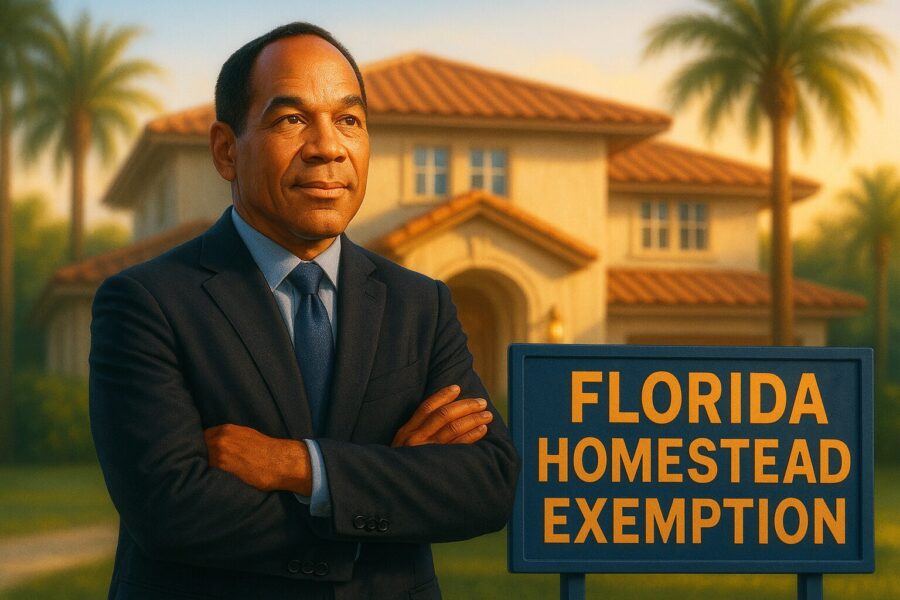If you’ve watched The People v. O.J. Simpson on Netflix, then you already know the courtroom drama. But what most people don’t realize is that the real brilliance wasn’t just in the legal defense — it was in how O.J. Simpson protected his wealth after the trial.
In this three-part series, we’ve been uncovering how his team used legal tools available to everyday entrepreneurs to shield assets from massive judgments. If you missed them, go back and read Part 1: How O.J. Used Trusts to Shield His Wealth and Part 2: How Retirement Accounts Helped Him Stay Judgment-Proof. This final installment looks at perhaps the most overlooked (but powerful) piece of the strategy: how changing his address to Florida put his home completely out of reach from creditors.
We all remember it: “If the glove doesn’t fit, you must acquit.”
Sure. But what if you’ve been hit with a $33.5 million civil judgment?
For most people, that kind of legal loss would be financially catastrophic. But not for O.J. Simpson. Long after the headlines faded, he was still living large in Florida — golfing, signing memorabilia, and most importantly, living in a home his creditors couldn’t touch.
Today we’re looking at the final layer: how a change of address (and Florida’s generous homestead laws) completed Simpson’s legal fortress.
Disclaimer: I’m not a lawyer, and this isn’t legal advice. These are real-world examples used for educational purposes. Before implementing any of these strategies, always consult your legal counsel and tax strategist. Yes, both. No, your buddy from high school who “knows a guy” does not count.
Homestead Laws: Originally for Farmers, Now Used by Former NFL Stars
Let’s take a quick trip back in time. Homestead laws were designed to prevent families from being booted out of their homes during hard times. You know — sick husband, bad harvest, local banker with a crooked mustache. Classic 1800s stuff.
These laws were about dignity, protection, and keeping families in their homes. Even when the finances got rough.
But fast forward to today, and guess what? Those same laws are still on the books. Only now, they’re not just helping frontier families. They’re protecting celebrities, high-net-worth individuals, and maybe even you… if you know how to use them.
Why O.J. Traded L.A. for the Sunshine State
After the criminal trial ended and the civil suit began, O.J. knew that staying in California would mean trouble. California’s homestead protection has a cap. At best, it shields around $626,000 in equity. That might cover the guest house in Brentwood… if you’re lucky.
So Simpson did what any strategic multimillionaire with solid legal advice would do: He moved to Florida.
And this wasn’t just about beaches and golf courses. This was chess, not checkers.
Florida’s homestead protection, written into the state constitution (Article X, Section 4), says if the property is your primary residence, it’s protected from forced sale by creditors. There’s no dollar cap. None. Zero. Zilch.
Let me repeat: If you live in a mansion on a half-acre lot in the city, or up to 160 acres in the country, and it’s your home — it’s legally untouchable.
The state of Florida basically said: “You can owe +$33 million, but if you live here, your house is off-limits.” to any type of creditor. Now that’s what I call a warm welcome.
How Florida Smokes California and Nevada on Asset Protection
Let’s put things in perspective with a little state-by-state comparison. California gives you a homestead exemption based on the county’s median home price, ranging from about $313,200 to $626,400. That might cover a driveway in Los Angeles or a kitchen remodel in the Bay Area.
Nevada is a bit better — it protects up to $605,000 in equity. Not bad… unless you own a McMansion.
But Florida? Florida doesn’t care how fancy your house is. The law protects the entire value of your primary residence, as long as you live there and meet a few simple criteria.
This is why Simpson’s relocation was more than just a change in zip code. It was a masterclass in legal maneuvering. He didn’t just move to Florida. He moved into a bulletproof asset.
How His Team Stacked the Deck — Legally
Let’s look at the full playbook here. Because O.J.’s legal team didn’t just rely on one shield. They layered protections like a financial lasagna.
First, he had assets placed in trusts — which means (legally speaking) he didn’t technically “own” them. That makes it hard for creditors to collect.
Then there were the retirement accounts. Pensions, IRAs, and qualified plans are protected under federal and state law. Simpson couldn’t lose those, even with a judgment hanging over him.
Add in the possibility of annuities and life insurance policies (which in some states also carry creditor protection), and now you’ve got yourself a pretty sophisticated structure.
But the final and most brilliant move? Buying a house in Florida and making it his primary residence. That homestead exemption made it the perfect final layer. No one could touch it — not even the Goldman or Brown families. Despite the size of the civil judgment.
We’re not talking about loopholes. We’re talking about intentional, strategic planning using laws that were already on the books.
So What’s the Takeaway for You?
Maybe you’re not a former NFL star with a high-profile trial in your past. But if you are, just call me. But if you’re a business owner, high-income earner, or real estate investor with assets to protect, there’s a lesson here for you:
Planning beats panic.
Too many people wait until they’re in legal hot water to start thinking about asset protection. By then, it’s often too late. You can’t move your house, fund a trust, or re-title your assets mid-lawsuit. The IRS and your creditors don’t exactly hand out do-overs.
The strategies we’ve covered in this series are available to everyone, not just celebrities.
The catch? You have to act before something goes wrong. Otherwise… it’s too late.
Work With People Who Know What They’re Doing
This stuff is complex. It’s not something you want to DIY on a Saturday afternoon after watching a few YouTube videos.
If you’re serious about protecting your wealth, your lifestyle, and your legacy, you need to work with a strategic team. A tax advisor and an attorney — who understand how to structure things correctly.
Because let’s face it: the only thing worse than overpaying in taxes is working your whole life to build something… only to lose it all in one lawsuit.
Welcome to the New Age of Accounting. Let’s begin.

Chris is the Managing Partner at Weston Tax Associates, a best-selling author, and a renowned tax strategist. With over 20 years of expertise in tax and corporate finance, he simplifies complex tax concepts into actionable strategies that drive business growth. Originally from Sweden, he now lives in Florida with his wife and two sons.











